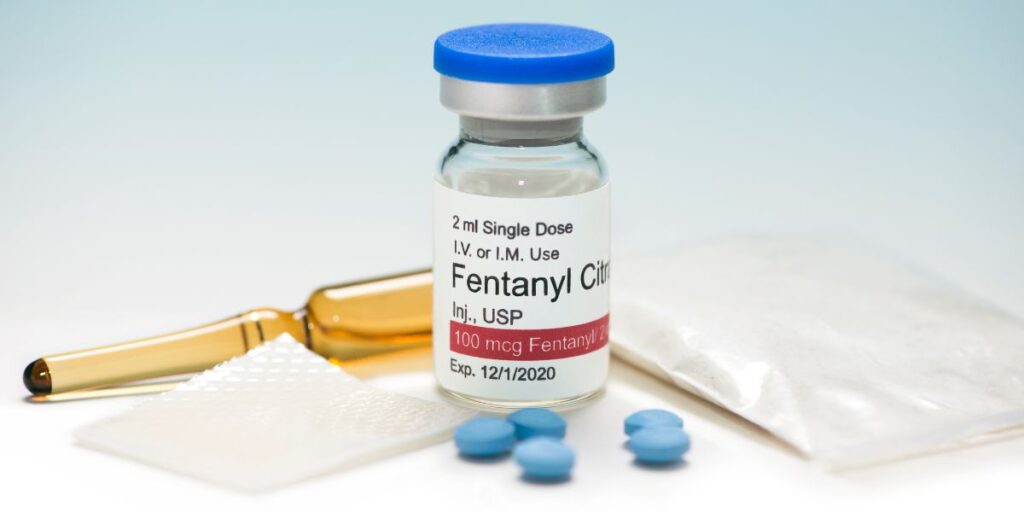Fentanyl Withdrawal Symptoms and Detox

Fentanyl is known to worsen the opioid crisis. However, not as many people understand the harshness of fentanyl withdrawal symptoms. These symptoms can make it challenging for individuals to seek help. Some people who get fentanyl for pain might depend on it physically and will face severe withdrawal symptoms when they try to stop.
Not all people hooked on opioids are using them the wrong way. We need to make sure that treatment for fentanyl use is easy to access, caring, and available quickly. This is important because opioid use and overdose deaths are becoming more common. We must address this issue by providing better treatment options for those struggling with fentanyl use.
Accessible and compassionate care can help prevent overdose deaths and improve outcomes for individuals dealing with opioid addiction. This means teaching about fentanyl addiction and treating it by dealing with withdrawal signs and what causes addiction.
What Is Fentanyl?
Fentanyl is a synthetic opioid that is made in labs for pain. It’s a medication like morphine and heroin but way stronger— about 50 to 100 times stronger.
A little morphine can assist in pain relief. However, an even lesser quantity of fentanyl can achieve the same effect. In simple terms, 10 milligrams of morphine is a small amount compared to 100 micrograms of fentanyl. Fentanyl is much more potent than morphine in smaller doses.
Fentanyl is a strong pain medication prescribed by doctors for severe pain or for those who are sick and need relief. People use it to manage their pain effectively. Doctors use fentanyl to provide relief to patients experiencing intense pain.
People often mix fentanyl with other illegal drugs outside hospitals because it is so potent. This makes it dangerous when not used the right way.
Because a tiny bit of it can make people feel high, mixing it with other drugs lets sellers make more money and makes the drugs more addictive. If someone unknowingly takes drugs containing fentanyl, they can become extremely ill or addicted. This is because they may accidentally consume too high of a dose.

Fentanyl Withdrawal Symptoms
When someone stops using fentanyl, the difficulty they face can vary. Several factors influence how opioid withdrawal affects someone. These factors include the length and frequency of fentanyl use, the typical amount taken, and the person’s overall health. Additionally, any other health conditions or dependencies can also impact the situation.
Stopping fentanyl abruptly, without slowly decreasing the dose with a doctor’s guidance, can worsen withdrawal symptoms. It can also increase the risk of experiencing post-acute withdrawal syndrome (PAWS). PAWS can lead to prolonged difficulties after you stop taking the drug.
The terrible feelings from stopping fentanyl can start just a few hours after the last time someone took it. People know this early stage as acute withdrawal. Sometimes, people take extra fentanyl when they feel unwell to avoid getting sick or to make it easier to stop using.
When someone stops taking fentanyl for a short time, they might feel:
- Sick to their stomach
- Vomiting
- Sweating a lot
- Feeling like they have the flu
- Getting chills
- Having goosebumps
- Running a fever
- Feeling worried
- Having sudden changes in how they feel, sometimes feeling upset
- Fatigue
- Joint and muscle cramps
- Stomach cramps
- Breathing weirdly
- Diarrhea
- Dehydration
Side Effects of Fentanyl
After stopping fentanyl, lasting effects can still occur even after detox. These effects may appear unexpectedly in the weeks following. People detoxing at home may have more withdrawal symptoms than those getting help from doctors for fentanyl detox.
The long-lasting signs of stopping fentanyl are:
- Trouble sleeping
- Desperately wanting the drug
- Feeling more pain and being more sensitive to light and noise
- Not being able to enjoy things
- Feeling depressed
- Feeling worried
- Thinking about hurting oneself or thoughts of suicide
- Muscles twitching
- Having trouble remembering things
The National Institute on Drug Abuse (NIDA) highlights that pain relievers like fentanyl are primarily responsible for numerous overdose fatalities. From 2010 to 2017, the percentage of individuals in the United States succumbing to fentanyl escalated from 14.3% to 59%.
People try to detox by themselves but go back to using when the withdrawal gets too harsh. Fentanyl tolerance decreases quickly. People who restart using may take too much, causing overdoses and death.
How Long Does Fentanyl Withdrawal Last?
Quitting without assistance can be challenging and may not provide the necessary support for success. Medical supervision during detox can also play a crucial role in the process. The things that decide how strong the withdrawal feels are the same things that determine how long the withdrawal lasts.
After three days, the body’s symptoms of fentanyl withdrawal get better, but the desire for the drug can last longer. After getting through fentanyl detox, experts say it’s important to keep getting help for addiction. This guide explores why addiction happens and offers strategies to prevent relapse and manage withdrawal symptoms effectively.

Can You Die from Fentanyl Withdrawal?
Dying from withdrawal from fentanyl or any opioid can happen, although it’s not common. Detox from fentanyl is hard on the body and can lead to unexpected and sometimes deadly side effects.
Feeling stressed, sad, or anxious during withdrawal can lead to self-harm from using substances excessively. Detox programs with doctors help with feelings in the mind and strongly push for more treatment to reduce the risk of suicide. This helps with the patient’s behaviors and emotions during withdrawal.
Fentanyl Detox and Treatment for Opioid Use Disorders
If you or someone is struggling with fentanyl addiction, support is available for mental health and substance abuse disorders. Support is available for those dealing with fentanyl addiction.
At Northridge Addiction Treatment Center, we assist individuals with opioid use disorder and address fentanyl withdrawal while taking a personalized and intensive approach to treatment. This means we consider the person’s physical, mental, and emotional well-being. Our goal is to provide comprehensive care for those struggling with addiction.
Our medical detox program provides a calm environment with constant medical assistance, which is especially helpful during opioid withdrawal.
Reach out to us now to talk with our treatment specialists. They’re ready and waiting to help you get the support you need.
Find Meaningful Recovery
Our caring and compassionate specialists are eager to help you comfortably navigate this journey to recovery. Our individualized treatment plan, programs, and therapies may be a perfect match for you or your loved one. Let us assist you in living the happy life you deserve. It starts with a phone call.




